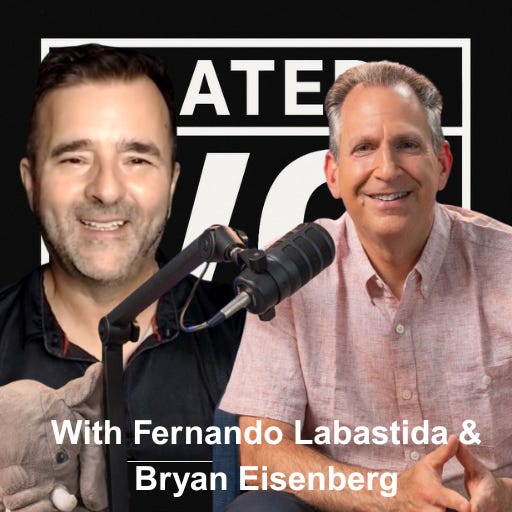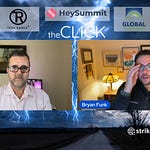A few months ago, I sat across from Bryan Eisenberg at a coffee shop in Round Rock, Texas.
Bryan, for those who don’t know, is one of the OGs of digital marketing. Together with his brother Jeffrey, he coined the very terms that shape our field: Conversion Rate Optimization, Persuasion Architecture, Personas.
I was telling him about this new thing I was working on - a framework that used AI to amplify founders’ voices through content. I called it the AI Organic Content Cascade.
He listened. Nodded. Looked out into the distance. Then he said two words that changed everything:
“Viral Genius.”
Those words reframed everything I was doing. And they came from someone who’s been shaping marketing vocabulary for three decades.
The Human Spark Behind the Algorithm
Bryan told me something that stuck: AI can replicate a lot — but not the human spark.
That moment at the coffee shop, he said, was what algorithms can’t recreate. It’s the human insight, the emotional resonance, the story that cuts through noise.
Every founder has a zone of genius: a perspective that makes them see the world differently. My job, he said, was to extract that genius and make it spread.
That’s what “Viral Genius” really means.
It’s not about going viral for the sake of reach. It’s about spreading real ideas with authentic voices that AI can’t fake.
The Stories We Tell…and the Ones That Build Us
Bryan’s new book, I Think I Swallowed an Elephant: The Stories We Sell, The Success We Build, captures this idea perfectly. Each of us lives inside stories - about our businesses, our health, our identity - until life forces us to rewrite them.
In our conversation, Bryan shared his own moment of rewriting. After discovering his blood sugar had skyrocketed, he realized his old story, “I need to keep up with my kids,” no longer worked. They’d grown up.
He needed a new story to live by.
That’s the power of storytelling for founders and brands alike: Change your story, and you change your world. Because as Bryan puts it:
“Words are worlds.”
He Who Controls the Vocabulary…
Bryan and Jeffrey learned this truth from their mentor, Roy H. Williams, the Wizard of Ads. Roy’s mantra was simple:
“He who controls the vocabulary controls the industry.”
The Eisenbergs did exactly that. They named the key concepts of modern marketing — and in doing so, they shaped how we think about the craft itself.
It’s why language is the cornerstone of category design. Naming your idea gives it power. It gives the world a way to talk about it.
From Roy’s Fax Machine to the Viral Genius Era
When Bryan first met Roy, Roy was faxing out his “Monday Morning Memo” every week. That weekly memo became the seed for what is now the Wizard Academy — a castle-like business school outside Austin dedicated to the art of storytelling.
It’s poetic.
One man used a fax machine to build a castle. Because he mastered the vocabulary of persuasion.
And now, decades later, Bryan’s reminding all of us that storytelling - not algorithms - still drives influence, trust, and category creation.
Brandable Chunks and the Future of Marketing
Bryan ended our conversation with one more timeless principle: If you want your message to spread, make it stick.
“Use brandable chunks — phrases that people can’t help but repeat.”
“Viral Genius.”
“Fans First.”
“The Stories We Sell.”
These phrases aren’t just clever slogans. They’re cultural shortcuts - the DNA of great marketing.
Where to Hear More
Bryan Eisenberg will be one of the featured speakers at the Strike Marketing Summit, with his talk: “I Think I Swallowed An Elephant: The Stories We Sell, The Success We Build.”
He’ll be speaking in the Founder-Led Marketing & Storytelling track, sharing his frameworks for using authentic stories to build enduring success — and teaching founders how to name and claim their own “brandable chunks.”
Listen to the full conversation on The Viral Genius Podcast - and get ready to rethink how stories, not strategies, build empires.












